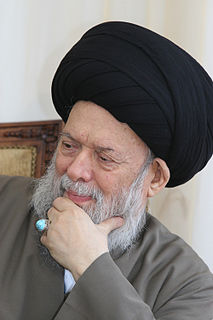A Quote by Mohammad Hussein Fadlallah
Absorption in Imam Husayn's affairs (his life and his person, etc.), away from his missionary side is backwardness.
Quote Topics
Related Quotes
Samuel Beckett is the person that I read the most of - certainly the person whose books I own the most of. Probably 800 or 900, maybe 1,000 books of just Samuel Beckett. By him, about him, in different languages, etc. etc. Notebooks of his, letters of his that I own, personal letters - not to me, but I bought a bunch of correspondence of his. I love his humor, and I'm always blown away by his syntax and his ideas. So I keep reading those.
In a sense, the religious person must have no real views of his own and it is presumptuous of him, in fact, to have any. In regard to sex-love affairs, to marriage and family relations, to business, to politics, and to virtually everything else that is important in his life, he must try to discover what his god and his clergy would like him to do; and he must primarily do their bidding.
A man is likely to mind his own business when it is worth minding. When it is not, he takes his mind off his own meaningless affairs by minding other people's business.This minding of other people's business expresses itself in gossip, snooping and meddling, and also in feverish interest in communal, national and racial affairs. In running away from ourselves we either fall on our neighbor's shoulder or fly at his throat.
What a wee little part of a person's life are his acts and his words! His real life is led in his head, and is known to none but himself. All day long, the mill of his brain is grinding, and his thoughts, not those of other things, are his history. These are his life, and they are not written. Everyday would make a whole book of 80,000 words -- 365 books a year. Biographies are but the clothes and buttons of the man -- the biography of the man himself cannot be written.
As a guy develops and practices his masculinity, he is accompanied by an invisible male chorus of all the other guys, who hiss orcheer as he attempts to approximate the masculine ideal, who push him to sacrifice more of his humanity for the sake of his masculinity, and who ridicule him when he holds back. The chorus is made up of all the guy's comrades and rivals, his buddies and bosses, his male ancestors and his male cultural heroes--and above all, his father, who may have been a real person in his life, or may have existed only as the myth of the man who got away.
A child in his earliest years, when he is only two or a little more, is capable of tremendous achievements simply through his unconscious power of absorption, though he is himself still immobile. After the age of three he is able to acquire a great number of concepts through his own efforts in exploring his surroundings. In this period he lays hold of things through his own activity and assimilates them into his mind.
If he [the Artist] were to take up the pen it would be...to better express his individuality and explain it to others; or else to put his internal affairs in order...to deepen and sharpen his relationship with his fellow men because other souls exert an immense and creative influence on our soul; or to try to fight for a world as he would like it to be, for a world that is indispensable to his life.

































